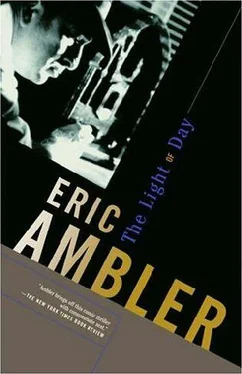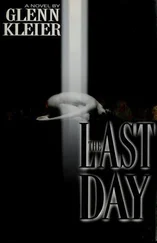Eric Ambler - The light of day
Здесь есть возможность читать онлайн «Eric Ambler - The light of day» весь текст электронной книги совершенно бесплатно (целиком полную версию без сокращений). В некоторых случаях можно слушать аудио, скачать через торрент в формате fb2 и присутствует краткое содержание. Жанр: Криминальный детектив, на английском языке. Описание произведения, (предисловие) а так же отзывы посетителей доступны на портале библиотеки ЛибКат.
- Название:The light of day
- Автор:
- Жанр:
- Год:неизвестен
- ISBN:нет данных
- Рейтинг книги:3 / 5. Голосов: 1
-
Избранное:Добавить в избранное
- Отзывы:
-
Ваша оценка:
- 60
- 1
- 2
- 3
- 4
- 5
The light of day: краткое содержание, описание и аннотация
Предлагаем к чтению аннотацию, описание, краткое содержание или предисловие (зависит от того, что написал сам автор книги «The light of day»). Если вы не нашли необходимую информацию о книге — напишите в комментариях, мы постараемся отыскать её.
The light of day — читать онлайн бесплатно полную книгу (весь текст) целиком
Ниже представлен текст книги, разбитый по страницам. Система сохранения места последней прочитанной страницы, позволяет с удобством читать онлайн бесплатно книгу «The light of day», без необходимости каждый раз заново искать на чём Вы остановились. Поставьте закладку, и сможете в любой момент перейти на страницу, на которой закончили чтение.
Интервал:
Закладка:
The only trouble is that, in the army, unless you are always making a damned nuisance of yourself, they would sooner give you the benefit of the doubt than not, because it’s easier for them that way. Besides, they know that even if you have made the whole thing up, at least they’ve had you sweating over it. The police are much more difficult. They don’t want you to have the benefit of any doubt. They want to start checking and double-checking your story, and getting witnesses and evidence, so that there is no doubt. “What was the lady’s name? Describe her. Exactly where was the house to which you escorted her? Was her mother in fact there? Did you see her? It takes twenty-two minutes to walk from the shopping arcade to the other side of Artillery Park, and a further thirty minutes to walk from there to the barracks. That makes fifty-two minutes. But you were two hours late getting in. Where did you spend the other hour and eight minutes? We have a witness who says that he saw you…” And so on. You can’t buy well-sirs good enough for the police for half-a-crown. Intelligence people are even worse. Nine times out of ten they don’t even have to worry about building up a case against you to go into court. They are the court-judge, jury, and prosecutor, all in one.
I did not know anything about this “Second Section” which the Commandant had mentioned; but it was not hard to guess what it was. The Turks have always been great borrowers of French words and phrases. The Ikinci Buro sounded to me like the Turkish counterpart of the Deuxieme Bureau. I wasn’t far wrong.
I think that if I were asked to single out one specific group of men, one type, one category, as being the most suspicious, unbelieving, unreasonable, petty, inhuman, sadistic, double-crossing set of bastards in any language, I would say without any hesitation: “the people who run counter-espionage departments.” With them, it is no use having just one story; and especially not a true story; they automatically disbelieve that. What you must have is a series of stories, so that when they knock the first one down you can bring out the second, and then, when they scrub that out, come up with a third. That way they think they are making progress and keep their hands off you, while you gradually find out the story they really want you to tell.
My position at Edirne was hopeless from the start. If I had known what was hidden in the car before the post Commandant had started questioning me, I wouldn’t have told him about Harper. I would have pretended to be stupid, or just refused to say anything. Then, later, when I had finally broken down and “told all,” they would have believed at least some of what I had said. As it was, I had told a story that happened to be true, but sounded as if I thought they were half-witted. You can imagine how I felt as I waited. With no room at all for maneuver, I knew that I must be in for a bad time.
The sun went down and the window turned black. It was very quiet. I could hear no sounds at all from other parts of the jail. Presumably, things were arranged so that there they could hear no sounds made in the interrogation room-screams, etc. When I had been there two hours, there were footsteps in the corridor outside, the door was unlocked, and a new guard came in with a tin bowl of mutton soup and a hunk of bread. He put these on the table in front of me, then nodded to his friend, who went out and relocked the door. The new man took his place on the bench.
There was no spoon. I dipped a piece of bread in the soup and tasted it. It was lukewarm and full of congealed fat. Even without my indigestion I could not have eaten it. Now, the smell alone made me want to throw up.
I looked at the guard. “Su?” I asked.
He motioned to the washroom. Evidently, if I wanted water I would have to drink from the tap. I did not relish the idea. Indigestion was bad enough; I did not want dysentery, too. I made myself eat some of the bread and then took out my cigarettes again in the hope that the new man might be ready to give me a match. He shook his head. I pointed to a plastic ash tray on the table to remind him that smoking was not necessarily prohibited. He still shook his head.
A little before nine, a twin-engined plane flew over the jail and then circled as if on a landing pattern. The sound seemed to mean something to the guard. He looked at his watch, and then absently ran his hand down the front of his tunic as if to make sure that the buttons were all done up.
More to break the interminable silence in the room than because I wanted to know, I asked: “Is there a big airport at Edirne?”
I spoke in French, but it meant nothing to him. I made signs, which he misunderstood.
“Askeri ucak,” he said briefly.
An army plane. That concluded that conversation; but I noticed that he kept glancing at his watch now. Probably, I thought, it was time for his relief and he was becoming impatient.
Twenty minutes later there was the distant sound of a car door slamming. The guard heard it, too, and promptly stood up. I stared at him and he glowered back.
“Hazirol!” he snapped, and then exasperatedly: “ Debout! Debout!”
I stood up. I could hear approaching footsteps and voices now. Then the door was unlocked and flung open.
For a moment nothing more happened, except that someone in the corridor, whom I could not see, went on speaking. He had a harsh, peremptory voice which seemed to be giving orders that another voice kept acknowledging deferentially- “Evet, evet efendim, derhal.” Then the orders ceased and the man who had been giving them came into the room.
He was about thirty-five, I would think, perhaps younger, tall and quite slim. There were high cheekbones, gray eyes, and short brown hair. He was handsome, I suppose, in a thin-lipped sort of way. He was wearing a dark civilian suit that looked as if it had been cut by a good Roman tailor, and a dark-gray silk tie. He looked as if he had just come from a diplomatic corps cocktail party; and for all I know he may have done so. On his right wrist there was a gold identity bracelet. The hand below it was holding a large manila envelope.
He examined me bleakly for a moment, then nodded. “I am Major Tufan, Deputy Director, Second Section.”
“Good evening, sir.”
He glanced at the guard, who was staring at him round-eyed, and suddenly snapped out an order: “Defol!”
The guard nearly fell over himself getting out of the room.
As soon as the door closed, the major pulled a chair up to the table and sat down. Then he waved me back to my seat by the bread.
“Sit down, Simpson. I believe that you speak French easily, but not Turkish.”
“Yes, sir.”
“Then we will speak in French instead of English. That will be easier for me.”
I answered in French. “As you wish, sir.”
He took cigarettes and matches from his pocket and tossed them on the table in front of me. “You may smoke.”
“Thank you.”
I was glad of the concession, though not in the least reassured by it. When a policeman gives you a cigarette it is usually the first move in one of those “let’s see if we can’t talk sensibly as man to man” games in which he provides the rope and you hang yourself. I lit a cigarette and waited for the next move.
He seemed in no hurry to make it. He had opened the envelope and taken from it a file of papers which he was searching through and rearranging, as if he had just dropped them all and was trying to get them back into the right order.
There was a knock at the door. He took no notice. After a moment or two, the door opened and a guard came in with a bottle of raki and two glasses. Tufan motioned to him to put them on the table, and then noticed the soup.
“Do you want any more of that?” he asked.
Читать дальшеИнтервал:
Закладка:
Похожие книги на «The light of day»
Представляем Вашему вниманию похожие книги на «The light of day» списком для выбора. Мы отобрали схожую по названию и смыслу литературу в надежде предоставить читателям больше вариантов отыскать новые, интересные, ещё непрочитанные произведения.
Обсуждение, отзывы о книге «The light of day» и просто собственные мнения читателей. Оставьте ваши комментарии, напишите, что Вы думаете о произведении, его смысле или главных героях. Укажите что конкретно понравилось, а что нет, и почему Вы так считаете.












